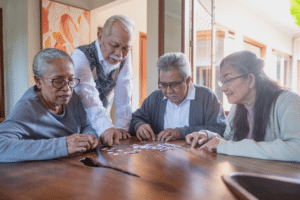A cancer diagnosis is undoubtedly filled with many difficult emotions. Your entire family may be experiencing fear, anxiety, or a sense of hopelessness when facing this disease together. Depending on the type of cancer and stage of progression, you might also be coming to terms with decisions your older loved one has made about treatment options. Whatever their specific approach to treatment entails, the experience of cancer understandably has a big impact on their overall mental and emotional state. In fact, symptoms of depression can creep up in cancer patients without other people immediately recognizing them amid all that’s going on. When your aging loved one is already going through so much emotional upheaval, it can be challenging to know if certain behaviors are natural and to be expected—or if they’re signs of something more serious.
When Older Adults with Cancer Also Suffer from Depression
Since there are so many variables at play with cancer, parsing its side effects and symptoms from that of depression often provides a challenge. One of the trickier aspects of the cancer-depression connection is that it can be difficult to figure out a specific diagnosis. For example, fatigue and depression share many common symptoms: people with depression frequently cite feeling drained and lethargic, while people suffering from fatigue feel unmotivated and low. More than that, they can both factor into each other, and can be directly caused by the cancer itself. To provide your aging loved one with the help they need, you must figure out the core problem.
Aside from fatigue, a cancer diagnosis brings on a range of emotional issues that are inextricably intertwined with depression. Your loved one might have lost interest in activities, have difficulty sleeping, and feel helpless when facing cancer. Fear, anxiety, confusion, and sadness are additional overlapping symptoms that affect both cancer patients and those suffering from depression. When you combine this with the fact that many older adults don’t vocalize their emotional pain, the result is that many depression cases in seniors with cancer go unrecognized, and therefore untreated. Compared with younger people who are often over-prescribed medication for depression, antidepressants for older adults are actually under-prescribed. We need to get better at recognizing depression in older adults, especially those already dealing with cancer, so we can begin offering proper treatment.
Determining Depression and Treating Symptoms
As caregivers or family members, there are multiple ways in which we can support our aging loved ones through cancer. Understanding the complex relationship between cancer and depression is the first order of business, as it can help open up doors to more proactive steps.
Fatigue, though not always linked to depression, can actually be a useful symptom to watch out for. “Instead of experiencing affective symptoms of depression, older adult patients are more likely to disclose somatic symptoms, such as fatigue, which often overlap with cancer-related symptoms.” They may be trying to put on a strong face and mask their hurt, since they may see disclosing mental illness to be a sign of weakness. They may think admitting depression shows a moral or character failing, so avoid any discussion of feelings. That’s why complaints of fatigue or other physical symptoms may be the only signs of depression they’ll share.
Knowing the other factors that can increase the risk of depression in older cancer patients can also help you be on the alert for them. If your aging loved one has advanced-stage cancer, is struggling to manage physical pain, or is significantly less mobile than before, they’re more likely to develop depression. Fortunately, there are proactive measures caregivers can take to help their loved ones suffering from depression and cancer simultaneously.
- If you believe your loved one is at risk for depression, talk with their cancer team immediately.
- Antidepressant medication might help to alleviate your loved one’s symptoms, and can be a temporary fix or long-term solution. Because certain antidepressants might not work well with cancer drugs, your loved one’s cancer team will need to be involved to prescribe medication safely.
- Support groups and one-on-one therapy can provide the necessary emotional support.
- Cancer patients are more likely to consider suicide, making suicide prevention services invaluable.
- Emotional support can also be found free-of-charge through IOA’s Friendship Line, 24-7.
- Take care of basic logistics like sorting out rides to appointments and meal preparation. While these might seem simplistic, managing practical day-to-day items can be a massive help to your loved one. It allows them to focus their energy on getting better and processing emotions rather than wasting it on mundane chores.
The more emotional support and people your aging loved one has around them, the less likely they are to experience clinical depression. For those living in the Bay Area, there are numerous community-based resources available, as well as programs to help your loved one feel supported. Organizations like Bay Area Cancer Connections and other support groups throughout the region offer compassionate help. Especially during this challenging time, caregivers, family members, and the surrounding community can really make all the difference to ensuring our aging loved ones feel as good as they possibly can.
If you’re unsure how to offer the support your aging loved one’s needs, Institute on Aging offers a range of programs and services to help. Connect with us today to learn more.







